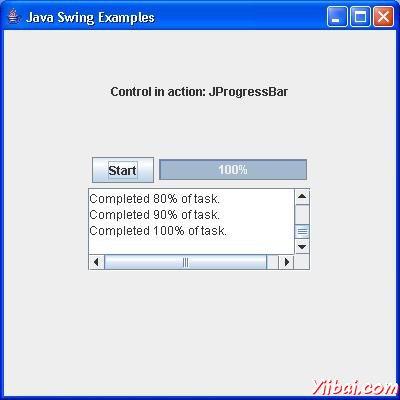Swing JProgressBar
JProgressBar類是一個組件,它可視地顯示某些任務的進度。
類聲明
以下是聲明 javax.swing.JProgressBar類:
public class JProgressBar extends JComponent implements SwingConstants, Accessible
字段域
以下是javax.swing.JProgressBar類的字段域:
protected ChangeEvent changeEvent --因爲事件的唯一有趣的屬性是不可改變的源,這是進度條,需要每個實例只有一個ChangeEvent事件。
protected ChangeListener changeListener --監聽發送進度條的模型的變化事件,他們重新調度變更登記的的事件監聽器後。
protected BoundedRangeModel model --對象保存數據進度條。
protected int orientation --無論是進度條是水平或垂直。
protected boolean paintBorder --是否顯示進度條周圍的邊框。
protected boolean paintString --無論在進度條上顯示的文本字符串。
protected String progressString --可以在進度條上顯示的可選字符串。
類構造函數
S.N.
構造函數 & 描述
1
JProgressBar()
Creates a horizontal progress bar that displays a border but no progress string.
2
JProgressBar(BoundedRangeModel newModel)
Creates a horizontal progress bar that uses the specified model to hold the progress bar's data.
3
JProgressBar(int orient)
Creates a progress bar with the specified orientation, which can be either SwingConstants.VERTICAL or SwingConstants.HORIZONTAL.
4
JProgressBar(int min, int max)
Creates a horizontal progress bar with the specified minimum and maximum.
5
JProgressBar(int orient, int min, int max)
Creates a progress bar using the specified orientation, minimum, and maximum.
類方法
S.N.
方法 & 描述
1
void addChangeListener(ChangeListener l)
Adds the specified ChangeListener to the progress bar.
2
protected ChangeListener createChangeListener()
Subclasses that want to handle change events from the model differently can override this to return an instance of a custom ChangeListener implementation.
3
protected void fireStateChanged()
Send a ChangeEvent, whose source is this JProgressBar, to all ChangeListeners that have registered interest in ChangeEvents.
4
AccessibleContext getAccessibleContext()
Gets the AccessibleContext associated with this JProgressBar.
5
ChangeListener[] getChangeListeners()
Returns an array of all the ChangeListeners added to this progress bar with addChangeListener.
6
int getMaximum()
Returns the progress bar's maximum value from the BoundedRangeModel.
7
int getMinimum()
Returns the progress bar's minimum value from the BoundedRangeModel.
8
BoundedRangeModel getModel()
Returns the data model used by this progress bar.
9
int getOrientation()
Returns SwingConstants.VERTICAL or SwingConstants.HORIZONTAL, depending on the orientation of the progress bar.
10
double getPercentComplete()
Returns the percent complete for the progress bar.
11
String getString()
Returns a String representation of the current progress.
12
ProgressBarUI getUI()
Returns the look-and-feel object that renders this component.
13
String getUIClassID()
Returns the name of the look-and-feel class that renders this component.
14
int getValue()
Returns the progress bar's current value from the BoundedRangeModel.
15
boolean isBorderPainted()
Returns the borderPainted property.
16
boolean isIndeterminate()
Returns the value of the indeterminate property.
17
boolean isStringPainted()
Returns the value of the stringPainted property.
18
protected void paintBorder(Graphics g)
Paints the progress bar's border if the borderPainted property is true.
19
protected String paramString()
Returns a string representation of this JProgressBar.
20
void removeChangeListener(ChangeListener l)
Removes a ChangeListener from the progress bar.
21
void setBorderPainted(boolean b)
Sets the borderPainted property, which is true if the progress bar should paint its border.
22
void setIndeterminate(boolean newValue)
Sets the indeterminate property of the progress bar, which determines whether the progress bar is in determinate or indeterminate mode.
23
void setMaximum(int n)
Sets the progress bar's maximum value (stored in the progress bar's data model) to n.
24
void setMinimum(int n)
Sets the progress bar's minimum value (stored in the progress bar's data model) to n.
25
void setModel(BoundedRangeModel newModel)
Sets the data model used by the JProgressBar.
26
void setOrientation(int newOrientation)
Sets the progress bar's orientation to newOrientation, which must be SwingConstants.VERTICAL or SwingConstants.HORIZONTAL.
27
void setString(String s)
Sets the value of the progress string.
28
void setStringPainted(boolean b)
Sets the value of the stringPainted property, which determines whether the progress bar should render a progress string.
29
void setUI(ProgressBarUI ui)
Sets the look-and-feel object that renders this component.
30
void setValue(int n)
Sets the progress bar's current value to n.
31
void updateUI()
Resets the UI property to a value from the current look and feel.
方法繼承
這個類從以下類繼承的方法:
javax.swing.JComponent
java.awt.Container
java.awt.Component
java.lang.Object
JProgressBar 例子
選擇使用任何編輯器創建以下java程序在 D:/ > SWING > com > yiibai > gui >
SwingControlDemo.java
package com.yiibai.gui; import java.awt.*; import java.awt.event.*; import javax.swing.*; public class SwingControlDemo { private JFrame mainFrame; private JLabel headerLabel; private JLabel statusLabel; private JPanel controlPanel; public SwingControlDemo(){ prepareGUI(); } public static void main(String[] args){ SwingControlDemo swingControlDemo = new SwingControlDemo(); swingControlDemo.showProgressBarDemo(); } private void prepareGUI(){ mainFrame = new JFrame("Java Swing Examples"); mainFrame.setSize(400,400); mainFrame.setLayout(new GridLayout(3, 1)); mainFrame.addWindowListener(new WindowAdapter() { public void windowClosing(WindowEvent windowEvent){ System.exit(0); } }); headerLabel = new JLabel("", JLabel.CENTER); statusLabel = new JLabel("",JLabel.CENTER); statusLabel.setSize(350,100); controlPanel = new JPanel(); controlPanel.setLayout(new FlowLayout()); mainFrame.add(headerLabel); mainFrame.add(controlPanel); mainFrame.add(statusLabel); mainFrame.setVisible(true); } private JProgressBar progressBar; private Task task; private JButton startButton; private JTextArea outputTextArea; private void showProgressBarDemo(){ headerLabel.setText("Control in action: JProgressBar"); progressBar = new JProgressBar(0, 100); progressBar.setValue(0); progressBar.setStringPainted(true); startButton = new JButton("Start"); outputTextArea = new JTextArea("",5,20); JScrollPane scrollPane = new JScrollPane(outputTextArea); startButton.addActionListener(new ActionListener() { @Override public void actionPerformed(ActionEvent e) { task = new Task(); task.start(); }}); controlPanel.add(startButton); controlPanel.add(progressBar); controlPanel.add(scrollPane); mainFrame.setVisible(true); } private class Task extends Thread { public Task(){ } public void run(){ for(int i =0; i<= 100; i+=10){ final int progress = i; SwingUtilities.invokeLater(new Runnable() { public void run() { progressBar.setValue(progress); outputTextArea.setText(outputTextArea.getText() + String.format("Completed %d%% of task.
", progress)); } }); try { Thread.sleep(100); } catch (InterruptedException e) {} } } } }
編譯程序,使用命令提示符。到 D:/ > SWING 然後輸出以下命令。
D:SWING>javac comyiibaiguiSwingControlDemo.java
如果沒有錯誤出現,這意味着編譯成功。使用下面的命令來運行程序。
D:SWING>java com.yiibai.gui.SwingControlDemo
驗證下面的輸出
